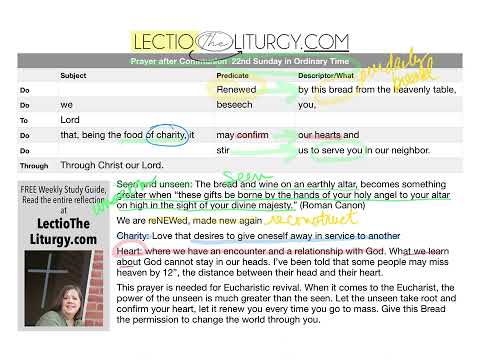Prayer After Communion 22nd Week in Ordinary Time
During the past couple weeks, the Holy Spirit has been showing me the contrast between things that are seen and unseen. This week we Lectio the Liturgy with the Prayer after Communion for the 22nd Sunday in Ordinary Time. This prayer brings us into the unseen.
Renewed by this bread from the heavenly table, we beseech you, Lord, that, being the food of charity, it may confirm our hearts and stir us to serve you in our neighbor. Through Christ our Lord.
At mass, we see bread and wine, but the unseen is much more that what we can see. Our heavenly bread began as something seen, bread and wine on an earthly altar. During the Roman Canon, or Eucharistic Prayer I, we pray that, God “command that these gifts be borne by the hands of your holy angel to your altar on high in the sight of your divine majesty, so that all of us, who through this participation at the altar receive the most holy Body and Blood of your son.” We still see bread and wine, but with faith, we receive the unseen, the Body and Blood of Jesus.
We are renewed by this bread. Other synonyms for renew include make again or reconstruct. As I reflected on being renewed, the Lord’s Prayer came to mind, “give us this day our daily bread.” In scripture, day and daily are different words. In fact, the Greek word used in for daily, epiousios is only used twice in Scripture, it is found only in the Lord’s prayer in the Gospels of Matthew and Luke. While the exact definition is unknown, Thayer’s definition says that it is the bread of our necessity, or the bread that suffices for each day. It is the bread the we need to be restored.
The prayer also describes this bread as the food of charity. In the Latin form of the prayer, we find the word caritatis used for charity. Charity is the kind of love that desires to give oneself away in service to others. The end of this prayer will tell us why we need charity.
Another unseen part of this bread is that it confirms our hearts. Confirm, as used here, is defined as making firm by adding strength and encouragement. Confirming our hearts is important because the heart is the point of entry of the Holy Spirit. The heart is where we have an encounter and a relationship with God. What we learn about God cannot stay in our heads, it must move to our hearts. I have heard it said that some people may miss heaven by twelve inches, the distance between their head and their heart.
The next time you receive Holy Communion, try receiving it in your heart. How do you find your heart? Bishop David O’Connell (now deceased) taught a simple method of the prayer of the heart. First, find a comfortable position, close your eyes, and breathe softly in and out through your nose. Next, imagine breathing into your heart and then, every time you inhale, imagine that your heart is saying, “Jesus.” If distractions come, just let them go. This space is your heart, this is where Jesus wants to meet you and give you His peace. This is the place where the Bread wants to confirm you. (Here is a link to the video if you’d like to watch the Bishop teach. )
Next we ask God that this bread would stir us to serve Him in our neighbor. Remember that the heavenly bread we consume is the food of charity, the kind of love that desires to give oneself away. This is the kind of love that God had for us when He gave us his Son. It is the love that Jesus had when He died for us, and it is the same love we receive when Jesus gives himself to us in the Eucharist. Because we have received this love, we have it to give away.
As I reflected on each part of the prayer, then on the prayer as a whole, I began to see that power that this prayer holds in Eucharistic revival. When it comes to the Eucharist, the power of the unseen is much greater than the seen. Let the unseen take root and confirm your heart, let it renew you every time you go to mass. Give this Bread the permission to change the world through you.
Thanks for praying with me,
Julie
